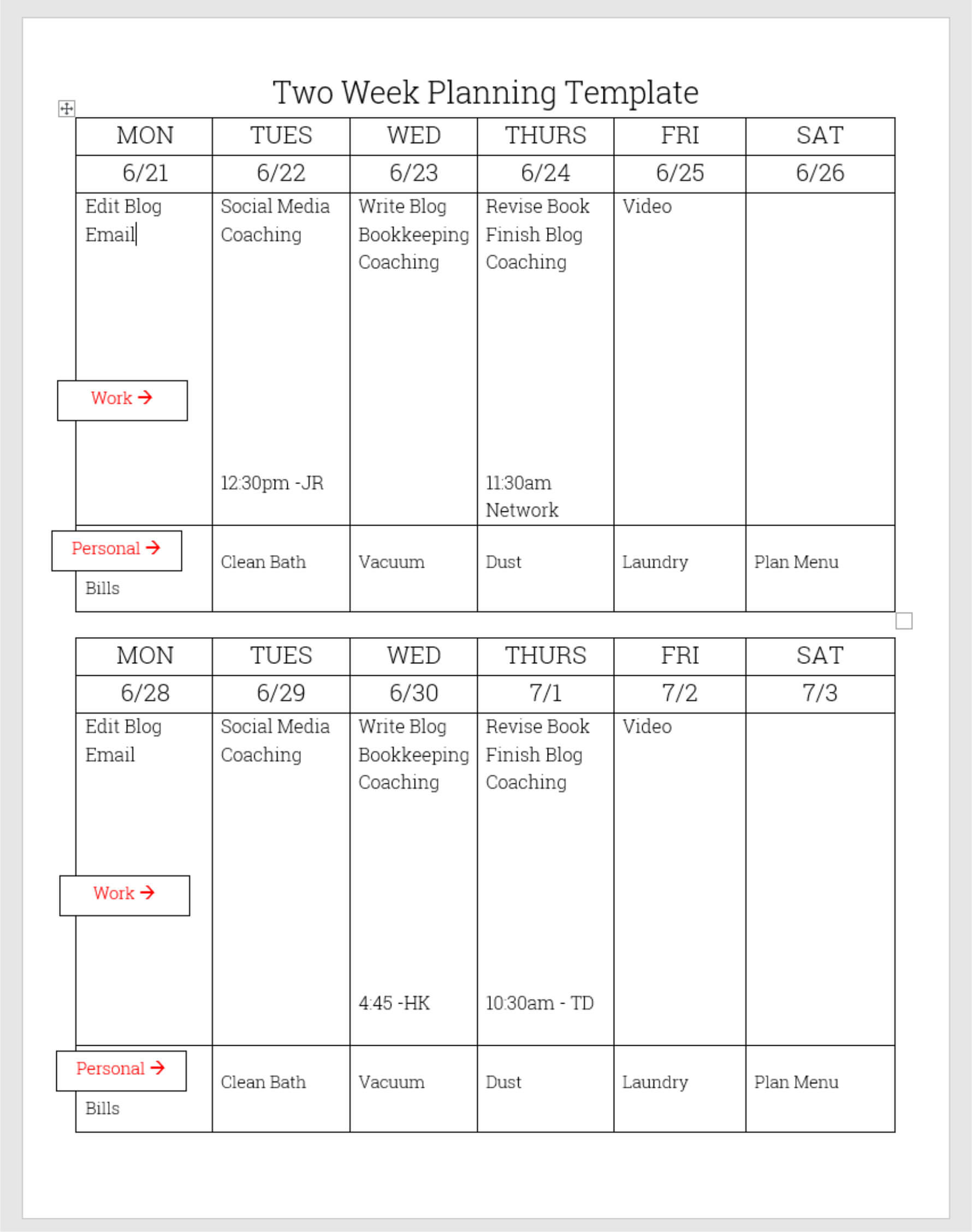Productivity – The Secret To Getting More Done

Do you know the secret to getting more done – increasing your productivity? It’s probably not what you think! In fact, you might be surprised at how time away or vacations impact your productivity. They provide much needed down time, inspiring new experiences, and an opportunity to do life at a different pace. And after a vacation, I always come back full of ideas and excited to get back to work – and more productive too!
Weekends are also glorious for me. I release myself from the pressure of working and make engaging with ones I love, tapping into my creative side, and tackling projects around the house or yard a priority. That’s energizing to me. Resting on the weekends makes increases my productivity during the work week.
What It Is NOT…
Productivity isn’t about cramming more and more into your life and getting more and more done. That’s a recipe for burnout! It’s about working smarter and putting your efforts into what really matters.
I’m at my best when I’m able to move from one activity to the next without rushing. That allows my creativity to kick in and I’m able to be fully present. That means I must make a concerted effort to limit what I take on. That enables me to invest in what will give me the best results in my life and work. The activities that give my life real meaning and make a difference in the lives of others.
It takes being intentional. Juggling coaching, writing, and my other business responsibilities, along with family and friends, requires careful planning. Productivity doesn’t just happen!
Here are some of my favorite tips to help you get the most out if each and every day:
1. Time With God First
Giving your first hour (or so) to God is like tithing your time. It’s a way of demonstrating your trust in God’s faithfulness. Time spent will Him never returns void. It seems counter intuitive, but I find that spending time spent with Him actually saves me time! It keeps me focused on what’s most important and I often discover powerful insights that serve me well.
2. Plan With Him
I want my day to be in alignment with God’s plan for that day. That’s why I make planning my day a part of my time with Him – something I do at the beginning of each day. It allows me to be intentional about the direction of my day. And when surprises pop up, I’m better prepared to adjust my day.
3. Plan Ahead
Recently I’ve begun taking a hard look at the next two weeks and anticipating what’s ahead using a “two-week template” where I list all the tasks to be done on each day. It’s been incredibly helpful! If I have family coming for the weekend, I know that I need to prep the food ahead of time so that I can really enjoy the time with them. I plot what I will prepare on what day. And having company also means cleaning, right? So, I plot that out on my weekly template too!
If we’re going away, I need to be sure that I’ve accomplished all that needs to be done before leaving so that I don’t have to think about work while I’m away. Whatever needs to be done prior to leaving also gets plotted on my two-week template.
Another fantastic benefit to plotting my weeks out in detail around what needs to be done is that it makes it easy to adjust when the unexpected pops up!
Having a snap shot of the next two weeks helps me get clear on the work load that works well for me and allows me to see if I’m investing my time in what will provide the best results!
4. Have Boundaries
It’s also important to know what your personal boundaries are. For example, for me, Mondays are my administrative day – the day I tackle a big chunk of the tasks that take place behind the scenes. I typically don’t schedule clients or other appointments.
On the other four work days, I limit my phone calls or meetings outside of coaching to three per day.
If I want to get tasks done and do them well, I must be realistic about what I can accomplish. I avoid over-scheduling, scheduling meetings back-to-back, and schedule margin.
5. Identify Your Slumps
Some people wake up raring to go and work best in the morning and slump in the afternoon. Others start out slow and rev up to a fever pitch near the end of the day. Either way, plan to tackle the tasks that require the most focus when your energy and concentration are at their best – when your productivity is at its peak.
6. Prioritize
The tendency is to do the easiest task first. Instead, do the one task that’s most challenging to you first. Don’t keep putting that task off. Completing that task is energizing and completing it makes it easier to tackle the other tasks on your list.
Next, identify your Top 3 – the most important tasks for that day. Not necessarily the most urgent tasks, but the tasks that will bring you closer to your goals. Make these your top priority.
7. Delegate, Eliminate, & Automate
Make sure you are doing the tasks that only you can do. Your time is valuable so use it wisely.
Then determine what you can delegate or automate. It will take extra time up front, but think of it as an investment in the future.
Finally, identify what you can eliminate altogether!
Beware! Keeping unnecessary tasks on your “to-do” energy drainer.
8. Work in Time Blocks
I prefer working in time blocks of 15, 30, 45, minutes or one hour over time slots like from 1:00-2:00. If you miss beginning your task exactly at 1:00 you will be tempted to skip that task altogether rather than beginning at 1:15 and working for an hour.
You may even wish to write tasks down on your “to-do” list like this:
Write blog (1 hr)
Bookkeeping (30 min)
Plan meeting (1 hr)
If anything unexpected happens (ha, ha!) then you can easily shave five or ten minutes or more off of each time block, while still investing time in them. You will be surprised at how much you still get done!
Setting a ticking timer is a great way to keep you on track while working in your time blocks. The subtle ticking reminds me that I’ve something to focus on.
9. Take Breaks!
Between your time blocks or between activities, be sure to take short breaks. Step away from your desk and move around. Complete a task that is more active or take a short walk. The temptation is to power out what needs to get done in spite of the decline in the quality of your work. Breaks allow your thoughts and ideas to percolate and it perks you up.
10. Focus – No Multi-tasking
Be 100% present with each task. You may think you have the ability to do more than one thing at a time, but, in reality, the quality of your work suffers and so does your productivity. I find it also contributes to a lingering sense of overwhelm.
11. Eliminate Distractions
There is no shortage of distractions – your phone, social media, and e-mails are constantly vying for your attention. When you let them distract you, it halts your flow. Make it a habit to return phone calls at specific points in your day. Log out of your social media accounts and close your e-mail. They will still be there!
Don’t be afraid to hang a “Do Not Disturb” sign on your door to limit interruptions. If you are diligent about getting back to people, and giving them your full attention when you respond, they will feel valued. Designate and communicate the hours you are available. That makes it easy for others to cooperate with you.
12. Be Tidy!
Taking five or ten minutes at the beginning or end of each day to clean up will save you oodles of time hunting for misplaced items and without the clutter, your mind is free to focus.
13. Do Something!
The more you plan and learn what works best for you, the more you’ll get done. There will be days you can’t get it all done, even when you’ve been realistic. When that happens, remember getting something done is better than getting nothing done. Each baby step forward counts!
How about you? What enables you to get more done?
© Can Stock Photo / dolgachov


This is so helpful! I am working on gettIng better in this area so I can be more efficient and have intentional times of rest. Thanks for sharing!
Hi Desiree! Yeah for getting better – that’s wonderful to hear! Rest is so, so good for you!